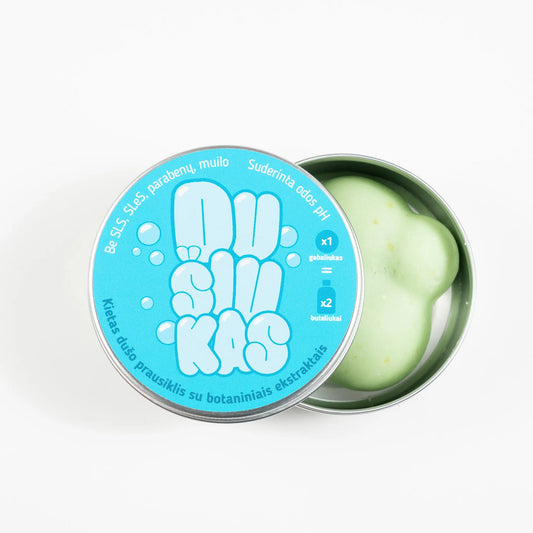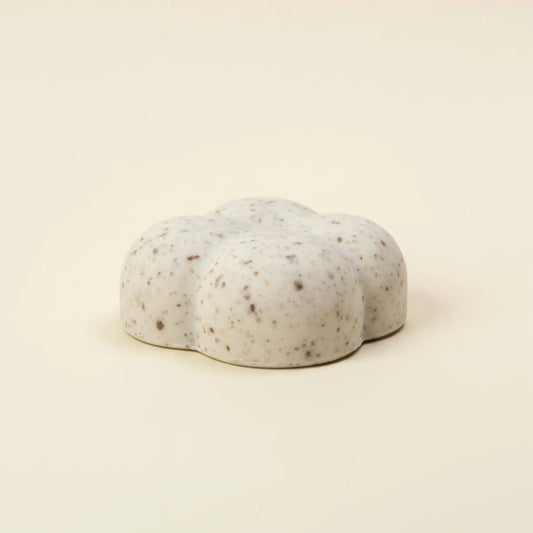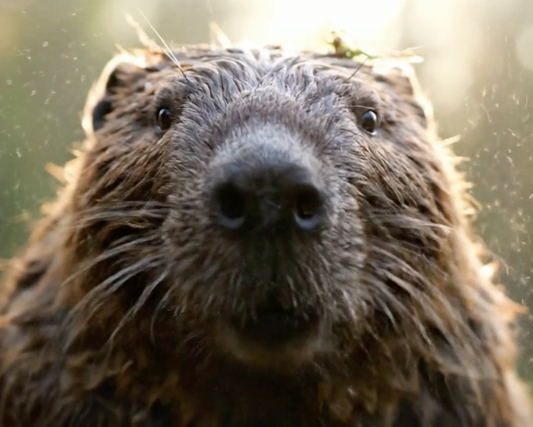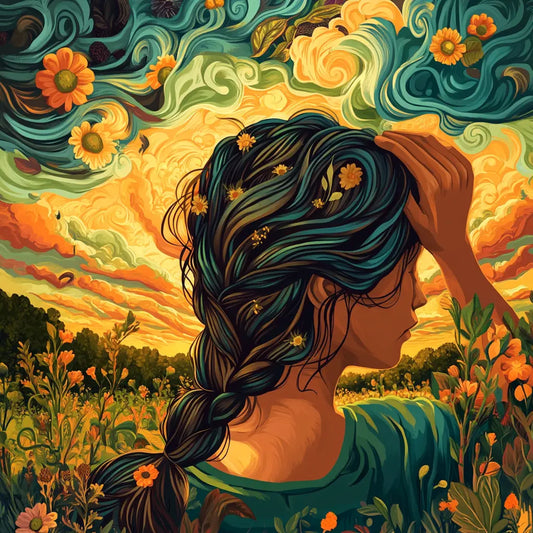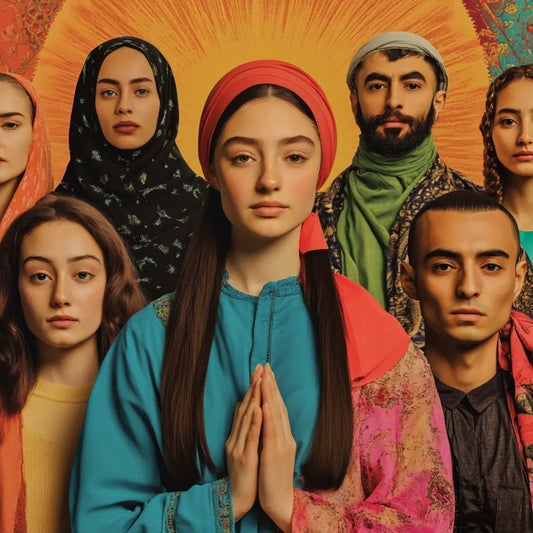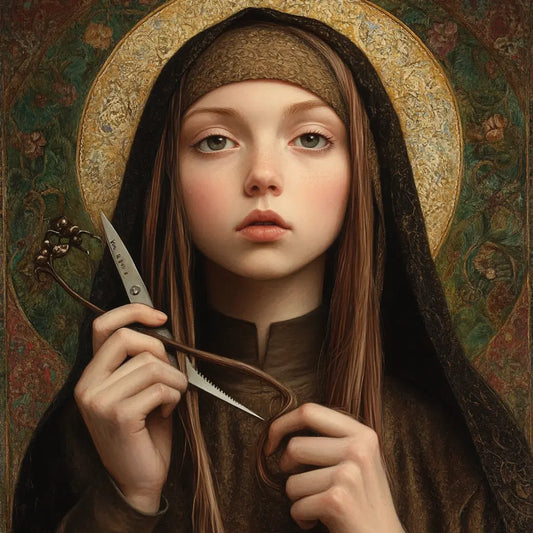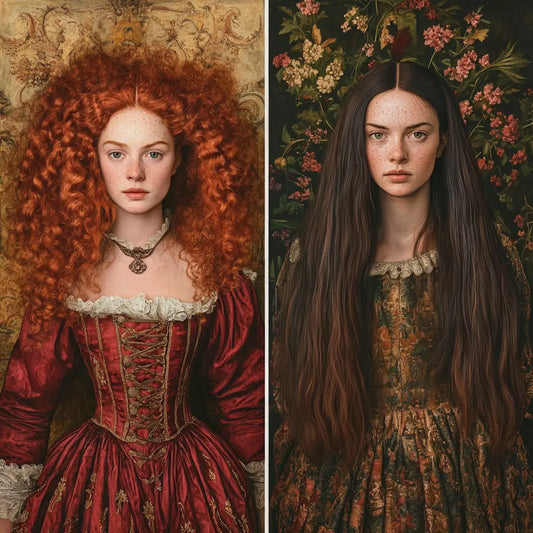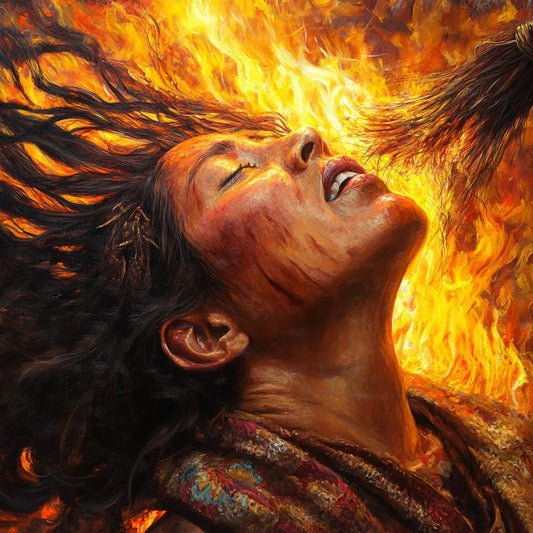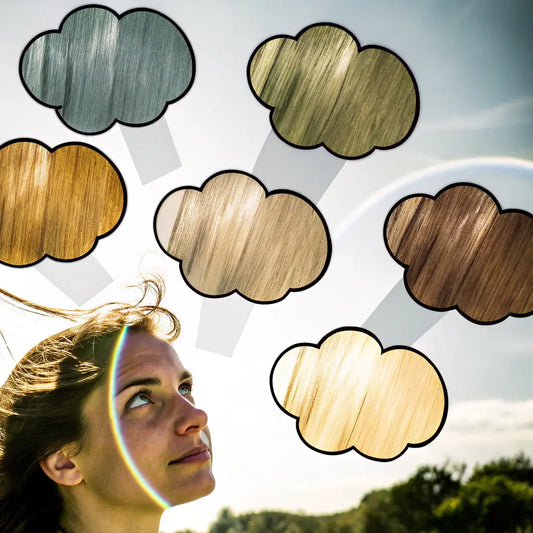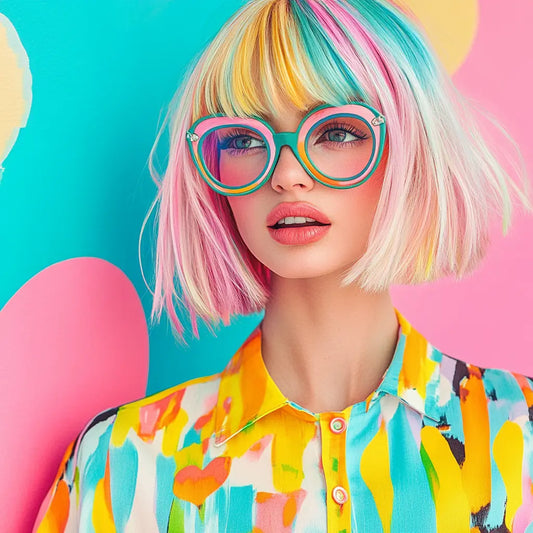Hair has always had some strange power. In almost every culture, it symbolizes more than just appearance - it's identity, strength, memories. And sometimes... something darker. That's why hair appears so often in ghost stories, ancient rituals, or horror movies. It remains even after death. It stores scent, DNA, and some believe - even the soul.
But here's the scary part: Many people still believe that hair grows after death . This myth originated in Victorian times, when mourners would swear that their loved ones' hair or nails grew longer while they were in their coffins. Forensic experts explain that it's just an optical illusion - the skin shrinks as it dries, making the hair and nails appear longer.
According to a 2010 study in the Journal of Forensic Sciences , as many as 40% of funeral service workers in the United Kingdom believed that this myth was still prevalent, especially among bereaved families.

Hair has a special ghostly role in Japanese horror culture. Think of Sadako from The Ring – her long black hair covering her face has become a symbol of horror. This is no coincidence. In Japan, loose hair is traditionally associated with sadness, madness, or unrestrained pain.
Meanwhile, in some rural areas of Mexico, after a person dies, their hair is still burned to free the soul.
Interesting historical fact: In Victorian England , it is estimated that one in three middle-class families kept a lock of the deceased's hair - often decorated as jewelry or even a painting. To this day, hundreds of such handicrafts can be found in museums, featuring hair from the living and the dead.
Psychologist Dr. Pamela Rutledge says:
"Hair holds identity, but when it is separated from the body, it becomes restless, like a message from beyond."
So the next time you find a single hair on your pillow or tangled in an old comb, maybe it's just biology. Or maybe... it's a memory that hasn't faded yet.

2. Folklore about hair growing after death
Let's start with one of the creepiest and most common myths: that hair grows even after death .
Victorian aesthetics of death
In the 19th century, people did not fear death – they cherished it. The bodies of the dead were kept at home, and photographs of the dead ( memento mori ) were common. It was also fashionable to collect mementos from the hair of the dead – pendants, rings, even paintings.
Hair was considered special because it didn't decay like the body . It remained. And that made it an ideal symbol of love or even mourning.
But some mourners claimed to have seen the hair of the deceased growing in their coffins . Thus were born legends that live on to this day.
The scientific approach
Forensic anthropologist Dr. William Maples explains: After death, the body loses moisture, causing the skin to dry out and shrink—especially around the lips, fingers, and scalp. This creates the illusion that hair or nails are growing longer , even though nothing is actually growing.
Nevertheless, this effect was so convincing that even many medical textbooks in the early 20th century still discussed the possibility of growth after death.
And even today, according to a 2021 survey, 35% of Britons still believe that hair can grow after death. The myth lives on.
The symbolism of dead hair in other cultures
-
Mexico : In some parts of Oaxaca, it is believed that if a hair is found in the bed or under the pillow after a funeral, it is a sign that the spirit is trying to contact you .
-
India : According to Hindu customs, the hair of the deceased must be burned or immersed in a river to free the soul .
-
Romania : If hair or nails are found in the graves that appear to have grown, it is a sign that the body may "return" as a vampire ( strigoi ). In this case, the body is reburied with protective rites.
-
In Hindu mythology : If a spirit cannot find peace, it is believed that its hair may grow unnaturally or become matted , indicating anxiety.
Stories of the dead caretakers
Some funeral workers still tell strange stories to this day.
One mortuary worker in New Orleans testified:
"We prepared the body of a woman whose hair was shoulder-length. After a week of examination, her hair seemed to have grown longer. No one had touched it. The family thought it was a sign that she still had unfinished business."
Is this a coincidence? Maybe. But there are many such stories.

What does modern science say?
Despite the myths of the gays, science is clear: hair follicles stop working after death . Hair growth requires oxygen, hormones, and cell division, all of which cease to function within minutes of death.
But myths remain because people want explanations where there is emotion, loss, or uncertainty .
And perhaps therein lies the answer.
Hair has always been the most human part we leave behind – tied in a ring, sewn into a dress, hidden under a pillow. It remains. It reminds. It speaks when there is nothing left to say.

3. Hair as a spiritual connection: what happens if you don't let go?
In the beliefs of many cultures, hair is not just a physical part of the body — it is considered a carrier of spiritual energy or even the soul . Therefore, cutting, keeping or burning it are not only acts of beauty, but also of spiritual significance.
Ancient beliefs: hair protects life
Some animist traditions believe that hair stores prana (life energy) or even emotional memories. The longer the hair, the more “spiritual power” it holds. Such beliefs exist among the peoples of North America, South Asia, and Polynesia.
Some tribes never cut hair after the death of a loved one until a special ceremony for the release of the soul took place. A hasty cut could cause spiritual confusion.
In Laos, among the Hmong, after an unexpected death, a portion of the deceased's hair would be tied into a talisman that was worn throughout the mourning period to ensure that the soul could safely pass to the next world.
Hair in Buddhist and Hindu rites
In Buddhism, monks shave their heads to renounce worldly life. But hair is also important in death rituals.
In Tibetan sky burial, a small portion of hair is often burned with the remains so that the soul can "ascend."
In Hinduism, hair is often burned with the body or immersed in sacred rivers - this helps to break worldly ties and free the spirit .
A 2016 study in the International Journal of Cultural Studies found that more than 60% of rural residents in North India still follow these ancient hair burning or immersion rituals , even when living in urban environments.
What if hair never gets burned?
Many creepy stories start with a simple thing: a strand of hair found that wasn't properly removed .
Some people say that ghostly activity only began after finding old hair in the attic, in books, or inside old furniture . Paranormal investigators believe that, especially if a person died suddenly or tragically, hair can act as a spiritual "battery" - storing emotional energy.
A case described by the British Cornwall Ghosts Archives : a woman purchased an antique pendant with braided hair. After that, she began experiencing strange dreams and a constant feeling that she was being watched. After she buried the strand with a thanksgiving ceremony, everything stopped.

Symbolism: soul release
Slavic folklore says: "Until the hair is cut, the soul wanders." Therefore, burning or cutting the hair of the dead was not only a hygienic but also a spiritual act.
Today, psychologists also note that grieving people often act symbolically with their hair :
-
Some keep a strand of their loved one in a box or pendant.
-
Others feel the need to cut their hair to express loss.
-
Some talk about the appearance of hair in dreams or even in reality , as if it were a sign.
When hair is left...
Finding a hair after the death of a loved one is more than just a strange moment. In Thai beliefs, it means that the spirit has not yet been released . In such cases, monks are called in and a cleansing ritual with water and incense is performed.
In the Brazilian spiritist tradition, hair samples must not be mixed – as it is believed that they can cause spiritual noise or confuse souls .
Hair stores memories. Love. Even pain. That's why it's considered a bridge between worlds .
When you hold a strand of someone's hair, ask yourself - what else is attached to it?

4. Ghosts Who Comb Hair: Symbolism and Mysterious Behavior
Combing hair is an intimate act. It is gentle, soothing. It is often associated with care: mothers comb their daughters' hair, lovers comb each other's curls. But when a ghost does the same thing?
It becomes frighteningly human – and at the same time inexplicably creepy.
Folklore about combing spiritual shadows
Many stories around the world tell of ghosts combing their own or others' hair , especially at night. They are often sad, silent, and their actions are strangely gentle.
For example, Japanese Yūrei are female spirits who died filled with grief or anger. They are depicted with loose black hair , pale skin, and white funeral clothes. In traditional Japanese culture, women who wore their hair down were considered crazy, sad, or shameful. So when a spirit combs its hair, it expresses pain without words .
Banshee, house spirits and weeping mothers
In Ireland, a banshee is a female spirit that foretells death. She is sometimes said to sit by the river and comb her silver hair with a bone comb . If a person finds it, it is a bad omen. If they steal it, it is even worse.
Slavic house spirits (e.g., Domovoj) may gently comb children's hair as a blessing. However, if they become angry, they may even pull it. In a 17th-century Ukrainian tale, a mother, mourning her dead son, kept dreaming of combing his hair. The priest advised her to burn the combs , as they held the spirit in this world.
Dreams in which someone combs your hair
Many stories involve dreams in which a deceased loved one combs the dreamer's hair . These dreams are often described as peaceful and healing.
Psychologists see this as a process of emotional healing . Dr. Kelly Bulkeley, a dream researcher, states:
"Combing hair in a dream represents restoring order, healing grief, or rebuilding identity after trauma."
However, some of these phenomena do not only occur in dreams .
Real testimonies: when the hands of spirits comb
A mother from Tennessee, USA, has told of waking up with her hair braided in a bun – even though she sleeps alone. This happened three times in a month after her grandmother died. She believes it was a farewell gesture from her grandmother , who used to braid her hair every night when she was a child.
Other stories:
-
The Filipino girl who felt someone gently caressing her hair at her grandfather's funeral
-
A UK hospice nurse says dying people often mention "something combing their hair" - a recurring sign of impending death
Sometimes it's a hallucination. Sometimes it's an internal act of comfort. But almost always it's a sign that someone still cares .

Literary Echoes: Hair and Mirrors
Combing hair is often depicted in front of a mirror , another symbol associated with spirits.
Mirrors are considered a portal to the afterlife in folklore. The classic image: a woman quietly combing her hair in front of a mirror… but her reflection behaves differently than she does . It's a popular motif in Gothic literature from Edgar Allan Poe to modern-day horror stories.
Why do ghosts comb their hair?
-
Care : a mother combing her child. This is tenderness.
-
Control : A ghost may comb their hair as a way to show their presence or reclaim their identity.
-
Mourning : long, loose hair symbolizes the anxiety of the soul .
Combing becomes a gesture between worlds – not frightening, but human. And that is what makes it so effective.

5. Supernatural Encounters: True Stories of Hair Haunting
Folklore is one thing. But when real people start sharing their experiences – stories of hair moving, disappearing or appearing without explanation – everything takes on a different meaning.
Here are some chilling testimonies that reveal that hair is not always just hair.
Nighttime strain
Jess, a 34-year-old mother from Oregon, said she was woken up one night by a strong tug on her hair . She lives alone with her daughter, who was sleeping peacefully in the other room at the time.
"I felt someone pulling my horse's tail. But there was no one in the room," she says.
After that, my hair kept coming loose while I was sleeping, even though it was tied tightly.
In a 2021 Reddit survey (over 5,000 responses), 12% of participants reported experiencing “phantom touches” to their hair , including tugging, stroking, or braiding.
Woven and unwoven by invisible hands
In Romania, it is believed that if a pigtail untangles itself at night, it may be a warning or protection from spirits .
Ana-Maria from Transylvania said:
"My grandmother braided my hair every night. After she died, I continued the same ritual. But three nights in a row I woke up with my hair unbraided. On the fourth night, I dreamed of her combing my hair and saying goodbye."
Hair appears where it shouldn't be
One of the strangest phenomena is the appearance of human hair in the strangest places .
-
In 2017, a Canadian study conducted at an abandoned 19th-century psychiatric hospital found hair under the floorboards. DNA analysis showed that it belonged to a woman aged 20 to 25 , even though no such resident was listed in the records.
-
A South Korean YouTuber exploring abandoned places found a clump of black hair inside a locked drawer - a cabinet that reportedly hadn't been opened in decades.
-
In the Enfield Poltergeist case in England (1970), investigators found white hair in the attic - no one in the family had that color.

Hair on altars and in rituals
In Haitian Voodoo and Afro-Brazilian religions, hair is often used on altars or in talismans as a way to connect the human soul to space.
One New Orleans legend: A woman bought an old house and found a tin box with a lock of a child's hair and the date: "August 1918." A few days later, she began to hear children's laughter in the hallway at night.
Ghost barbers?
Yes, some stories tell of mysteriously cut hair .
In 2016, residents of several villages in India complained that they woke up to find their hair cut off , even though they were sleeping alone and their doors were locked. Mass psychosis was suspected, but the cut strands were real .
Dolls with real human hair
Many cultures maintain a taboo against dolls with real human hair , believing that they can act as spirit vessels .
-
In Japan, the famous Okiku doll has real human hair that is said to grow continuously . It is kept in a temple, and monks periodically trim its bangs.
-
Some antique stores in the US have reported buyers returning dolls because their hair "moved" or "appeared in other places."
-
In Latin America, the legendary La Muñeca Maldita – the cursed doll – is famous for stories about hair that appears when a person sleeps .
What do paranormal investigators say?
Some researchers believe that hair acts as emotional tapestry – especially in areas where trauma or strong emotion has occurred.
John Zaffis, a famous US paranormal investigator, states:
"Of all the objects of persecution, the ones that most often trigger activity are combs or brushes with hair . It's not just combs. It's hair saturated with emotion."
Over 60% of his collection of "haunted objects" included hair or items with hair in them.
Maybe hair is more than protein and pigment.
Maybe they actually hold our feelings, memories, or even... whispers from beyond .

6. Hair left after death: a sign from the afterlife?
Imagine this: someone you loved has died. A few weeks later, you find a single hair on your pillow —even though you've already changed the sheets. Is this a sign? Or just a coincidence?
In many cultures and spiritual traditions, the hair left behind is considered a sign . As if the spirit has returned. As if something still remains unsaid.
The emotional power of a single strand
Hair is deeply personal. It holds scent, memories, identity. Finding it in a strange place after death can seem incredibly significant .
Psychologist Dr. Megan Devine says:
"Finding something tangible—like a hair—can feel like the person is back with us. It's like a bridge-building memory that we can hold on to."
Hair on the pillow: a sign or a blessing?
In Vietnamese tradition , hair found after the death of a loved one – especially on a bed or personal belongings – signifies that the soul has not yet left this earth . Incense is often burned and prayers are offered to release the spirit.
In Afro-Caribbean voodoo traditions, loose hair in unexpected places is considered a spiritual footprint - a sign that the deceased has returned briefly or is asking for help to cross over to the other side.
Similarly, in Eastern European villages, it is believed that hair found on windowsills, doorknobs, or under furniture are called "shadow marks" - remnants from a spirit visit.
Graves, relics, and the connection of hair with spirits
In some South American tribal traditions, hair is buried under tombstones to keep the soul at peace. If it is removed – accidentally or intentionally – it is believed that the spirit may return .
Victorians wore mourning jewelry with their hair , but some clergy warned that if a person died suddenly or tragically, wearing their hair could keep their spirit close .
The psychic theory of hair "memory"
Some modern spiritual practitioners believe that hair stores emotional energy , especially after experiencing trauma or strong emotions. This idea is called empathic resonance - where hair becomes a spiritual echo , repeating a feeling or memory.
Some ghost researchers believe that touching a hair over an "active spot" can cause strange feelings, waves of cold, or intense dreams.

Cleansing rituals if your hair looks "creepy"
If a found hair is troubling you – especially if it appears repeatedly – here are some rituals:
-
Cleaning with salt : In Japan, rooms are cleaned with salt and a broom, while praying silently.
-
Incense smoke : In India and Vietnam, sandalwood or frankincense is burned to "uplift spiritual memory."
-
Throwing hair into the water : In Celtic or Norse traditions, hair is thrown into a flowing river while saying farewell words.
These rituals are not meant to be fearful. They are meant to be farewell, to honor, and to bring closure .
Sometimes a hair is just a hair.
And sometimes... it's a memory that remains.
The one who is still mute speaks.

7. Ghosts with hair from around the world: from Japan to Peru
From Asia to America, hair is used to express sadness, spiritual anxiety, or supernatural power . Each culture interprets ghostly hair differently—but they all share one idea: loose hair often means that something from the afterlife has not yet emerged.
A journey around the world through the creepiest hair myths.
🇯🇵 Japan: Yūrei and Kuchisake-onna
In Japanese folklore, a Yūrei is a restless spirit , usually a woman who has died of sadness, anger, or betrayal. She is depicted with flowing black hair , a white kimono, and pale skin. The uncombed hair here symbolizes mental instability, shame, or grief - such spirits wander until they find peace.
Another terrifying figure is Kuchisake-onna , or "cut mouth." She wears a medical mask and asks if she is beautiful. Underneath the mask is a terrifyingly gaping smile. Her perfect hair and calm appearance only add to the horror when her true nature is revealed.
These images have also shaped the aesthetic of Japanese horror films. In films such as The Ring (Ringu) and Ju-On (The Grudge), female ghosts have wet, flowing hair that moves as if alive—symbolizing a spirit that is rotting but not yet gone.
🇮🇳 India and Southeast Asia: messy hair = restless spirit
In India, Nepal, and parts of South Asia, it is believed that women who die in childbirth or during menstruation return as ghosts with messy, flowing hair . These spirits are called churel - they may look beautiful from behind, but when they turn around, their faces are contorted with pain or anger .
In Balinese culture, leak witches sometimes steal hair or use it as masks. If a woman dies without receiving her final spiritual rites, her hair may be used in black magic to imprison her spirit.
In Thai funeral traditions, the hair of the deceased is combed during the ceremony so that the soul can leave without emotional "knots" .
🇵🇪 Peru and the Andes: hair and river spirits
In Andean mythology, rivers are considered sacred - they carry souls, energy and, in some cases, revenge. La Llorona , the "Weeping Mother" of Spanish-speaking countries, wanders the rivers in search of her children. Witnesses often report seeing hair floating on the surface , although the body is never found.
According to Quechua belief, hair is a cord between the body and the soul . During death rituals, hair is often burned or offered to lakes to "release the tension of the soul." If the ritual is not performed, the soul may return, especially during rain or floods.

🇷🇺 Slavs and 🇳🇴 Scandinavia: Spirits combing in the moonlight
In Slavic tales, ghosts comb their hair in the moonlight – a sign that they regret their unfinished lives . It is said: “If you hear the sound of combing at night, but see nothing – someone is longingly mourning you.”
In Scandinavian folklore, the power of witches lies in their hair . If you cut their tresses, their powers disappear. That's why some northern witches whose hair has never been cut are said to still wander the mountains or forests today - their hair stretching like cloaks of shadows .
Why is hair becoming a fear throughout the world?
Hair is used everywhere in horror stories. Why?
-
Hair does not decay , so it symbolizes the "fate" that remains.
-
They are personal – related to beauty, identity, love.
-
When hair behaves strangely – moving, appearing, slipping – it causes instinctive anxiety.

8. Psychological explanations: why do hair chases work this way?
Not all ghost stories are about the supernatural. Some are about emotions, loss, and psychological pain .
Stories about haunted hair run deeper than other horror motifs . Psychologists believe there's a good reason for this.
Hair is a body part we never expect to see again.
After a loved one dies, their voice fades, their scent disappears. But their hair often remains —in a brush, a coat, a book. It becomes the last physical memory.
This can be a comforting, but also a shocking reminder .
Psychologist Dr. Rachel Herz, a researcher in sensory perception, says:
"Hair is like a sensory time machine. It instantly brings back memories of a person, a place, a feeling. That's why it's so emotionally charged - especially during grief."
A single hair can trigger an unexpected wave of emotions , even if there is nothing supernatural involved.
The uncanny: familiar but false
Sigmund Freud introduced the concept of das Unheimliche – that which is familiar, but something about it does not fit , and therefore causes anxiety.
A separate hair is perfect for this concept .
You recognize him. He's familiar. But when he appears in a strange place —on an empty bed, in a locked drawer, on the edge of a mirror—your mind stops. Something's wrong .
The fear comes not from the hair, but from the feeling that it shouldn't be here .
Phantom Touches and Dreams During Bereavement
When grieving, people often feel phantom touches – hugs, caresses, smells.
A 2020 Death Studies study found that 38% of people who lost a loved one experienced dreams or the feeling of someone combing their hair within the first three months . Such dreams are often soothing, sometimes very emotional.
It may be the mind's attempt to heal through a familiar feeling - like a comb or a stroke of hair - that is so lacking.

Cutting or preserving hair as a mourning ritual
After a loss, people often act symbolically with their hair :
-
Some cut their hair - as if to mark a change in life.
-
Others preserve the hair of a loved one as a last physical connection with them .
In a 2017 survey of 200 women (aged 25-55) , about 22% admitted to saving their loved one's hair after death , calling it "the last remaining memory they can touch."
Therefore, hair-stalking stories feel personal , even if they are not true.
We are not afraid of a strand.
We are afraid of what it reminds us of.
Love. Pain. The fact that we haven't said goodbye completely yet.

9. Hair as an object of protection or curse
Hair doesn't just appear in ghost stories. It has been used in magic in many cultures , both as a means of protection and as a means of curses .
From love spells to witch bottles, hair has become one of the most powerful tools of magic , considered a spiritual "key" to a person.
Hair in curses and bindings
To bewitch someone , you usually need something very personal. Hair is the ideal choice. It carries DNA , scent, even symbolic energy.
In Europe, witches were accused of cutting people's hair and making wax or clay figurines , stabbing them with needles or burying them under the threshold. In Scandinavian villages, it was even believed that hair found in graves was a sign that the spirit had been bound by a spell .
In the Southern US Hoodoo practice, a woman's hair is placed in a jar with nails and grave soil - in order to bind her energy , confuse the mind, or hinder success.

Hair as protection
However, hair was used not only for spells – but also as protection against spiritual dangers:
-
In Lithuania and Slavic countries, young women braided their hair into small amulets, hid them under the threshold, or sewed them into pillows to protect against evil spirits.
-
In traditions with African and American roots, mothers sometimes placed their children's hair in small leather capsules - worn as necklaces or hidden in cribs.
-
In Icelandic folklore, hair was hung over doors, twisted into knots, to keep out souls wandering through storms .
Hair as carriers of spiritual energy
In some haunted houses, investigators find objects with human hair on them —combs, pendants, dolls. It is believed that such objects become channels through which spirits maintain contact with the world.
Paranormal researchers call them "energy bridges" - if a person died in a strong emotional state, their hair can become a storehouse of energy that continues to function after death.
So hair is not just a symbol of beauty.
They may be the key .
Lock.
Or... a window into a world where something else whispers.

10. Conclusion: What your hair can still remember
Hair is not just strands of keratin.
They are memories, identities, emotions . They represent love, longing, and sometimes even mourning or anger. That's why they appear so often in ghost stories, magical rituals, or haunting tales .
Science says hair doesn't grow after death. But the myths persist. Why? Because people need ways to explain what they're feeling .
An arrow on the pillow. A feeling that someone has touched your hair. A dream in which a loved one combs your hair. This could just be psychology. Or it could be a sign that someone is still around.
Hair lasts for centuries.
They don't change. They silently remind. They become like a spiritual antenna , carrying what we may not have finished saying yet.
The next time you find a hair on the cover of an old book, in a drawer, or even just on your pillow...
Ask yourself:
Is it just a strand?
Or maybe a remaining memory that still has a voice?
✨ What about you? Have you ever experienced a strange feeling related to your hair? A dream? A sign? Share your story - maybe someone else feels the same way.

11. Myth or Fact? Hair-Crazy Truths and Surprises
Even the most skeptical women get interested when it comes to hair and mysticism . Here are some very unexpected facts and famous myths that are worth knowing - sometimes they will make you smile, and sometimes... look over your shoulder.
1. Myth: Hair grows after death.
✅ Fact: It's just an illusion.
After death, the body loses fluids and the skin shrinks – which is why hair and nails appear longer , even though they are not actually growing. Forensic experts have confirmed that growth is impossible without oxygen, hormones and cellular activity .
2. Myth: Finding a hair after the death of a loved one is just a coincidence.
🌀 Fact (according to many cultures): This could be a sign.
In many traditions, from Vietnam to Brazil, finding a hair after a loss is believed to mean the spirit is still with them. Even if science doesn't support this, the emotional impact is very real .
3. Fact: Hair was once a precious mourning material.
During the Victorian era, people would make mourning jewelry from the hair of the deceased —rings, pendants, even miniature paintings. Queen Victoria wore a lock of Prince Albert's hair until her death.
4. Myth: Doll hair is always synthetic.
😱 Fact: Not always.
Most antique dolls (especially from the 19th century) had real human hair . Some were of unknown origin. This inspired stories of ghost dolls that had "memories" or even energy.
5. Fact: Hair was used in spells and protection.
In ancient Rome, hair was placed in “ defixiones ” (witch tablets) and buried at crossroads, inviting punishment from the gods. Meanwhile, Germanic peoples braided their hair into protective braids , which they hid under the threshold.
Hair can be not only a detail of beauty, but also a spiritual memory that remains... even when everything else disappears.

12. Practical tips: what to do if your hair is “sending signs”
Whether you're extremely sensitive or just occasionally feel anxious about a strange hair growth, these calming, respectful actions can help you navigate when a strand feels like "something more."
1. You found a hair in an unexpected place after losing it:
-
Don't be afraid. Breathe in. This could be an emotional moment – or a deep memory.
-
Honor it. Place the hair in a small envelope or plate, light a candle, and say thank you or goodbye.
-
If you want to let it go, burn it safely (outdoors, in a ceramic candlestick) with a silent farewell.
2. Do you have items with hair (e.g. combs, pendants) that "send anxiety"?
-
Cleanse the object with salt water or incense smoke - this is considered spiritual cleansing in many traditions.
-
Wrap it in a natural fabric (such as cotton or silk) and place it in a separate, quiet place.
-
If the feeling persists, bury it under a tree or throw it into a flowing river with the words: "I return what no longer belongs to me."
3. Do you have recurring dreams where someone is combing your hair?
-
Write it down in your journal. Such dreams often carry an emotional message or closure .
-
The next morning, light a candle or incense , and say a phrase, such as: "I accept peace. I release pain."
-
If your dream is cozy, create a ritual , such as gently combing your hair every night with a thought of gratitude.
4. Want to make a protective talisman?
-
Place one of your hairs in a small cloth bag with salt, dried lavender, and rosemary.
-
Carry it in your pocket, purse, or place it under your pillow for protection and peaceful dreams . This amulet is associated with Slavic and Appalachian folk magic .
Your hair is part of your story. If it's "saying" something, listen. You can decide how to respond: with calm, curiosity, or ritual .

13. FAQ: Hair and Ghosts – Answers That Sooth
1. Can hair really "absorb" spiritual energy?
Scientifically, no. However, many spiritual and folkloric traditions believe that hair can act as an energetic “conductor.” It stores DNA, scent, emotional connection—and is therefore considered a powerful spiritual symbol.
2. What to do with a loved one's hair after death?
It all depends on your beliefs and emotional connection. Here are some ways:
-
Store : in a small envelope, amulet, or family heirloom.
-
Burn : as part of a release ritual (common in Buddhist or Hindu rites).
-
Bury : under a tree, near a grave, or in a symbolic place.
-
To launch into the water : in a river or lake, uttering farewell words.
What matters is your intention. Do what feels right to you .
3. Why do so many ghosts comb their hair?
Combing hair often means:
-
Concern
-
Mourning
-
Identity restoration
In many cultures (especially Japan, Ireland), a spirit combing its hair is a grieving soul seeking peace or connection . This action symbolizes a silent longing, a restoration of order, or even an attempt to "remember oneself."

4. Does it bring bad luck to me to protect someone's hair?
Not always. In the 19th century, people often kept the hair of a loved one as a keepsake. But some cultures warn that if a person died unexpectedly or during a strong emotional state , their hair may retain "trapped" energy.
If in doubt , cleanse your hair with salt smoke or let it out with respect .
5. I dreamed that someone was combing my hair. What does this mean?
Such dreams usually symbolize:
-
Emotional healing
-
Longevity
-
Comfort
-
Connection with the deceased
Many people dream of loved ones combing their hair , especially in the first weeks after a loss. This can be a subconscious way of saying goodbye. If the dream is cozy, accept it as a gift .
Hair is physical, but its meaning often goes beyond logic. Whether it really speaks is up to you.
But one thing is clear: they remind us of .
Sometimes it's about love.
Sometimes it's about loss.
Sometimes – about what hasn't yet been said.


